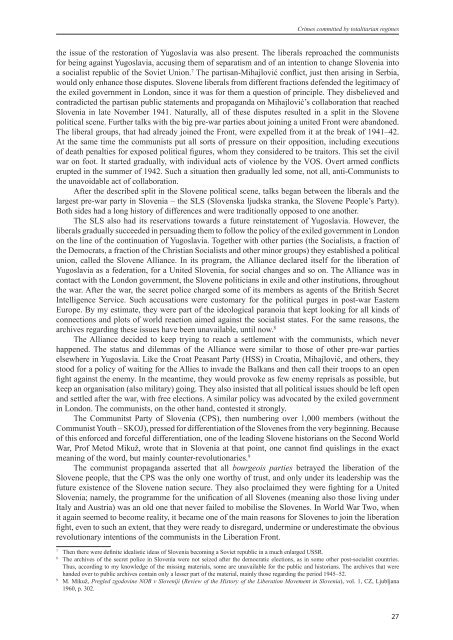crimes committed by totalitarian regimes - Ministrstvo za pravosodje
crimes committed by totalitarian regimes - Ministrstvo za pravosodje
crimes committed by totalitarian regimes - Ministrstvo za pravosodje
Create successful ePaper yourself
Turn your PDF publications into a flip-book with our unique Google optimized e-Paper software.
Crimes <strong>committed</strong> <strong>by</strong> <strong>totalitarian</strong> <strong>regimes</strong><br />
the issue of the restoration of Yugoslavia was also present. The liberals reproached the communists<br />
for being against Yugoslavia, accusing them of separatism and of an intention to change Slovenia into<br />
a socialist republic of the Soviet Union. 7 The partisan-Mihajlović conflict, just then arising in Serbia,<br />
would only enhance those disputes. Slovene liberals from different fractions defended the legitimacy of<br />
the exiled government in London, since it was for them a question of principle. They disbelieved and<br />
contradicted the partisan public statements and propaganda on Mihajlović’s collaboration that reached<br />
Slovenia in late November 1941. Naturally, all of these disputes resulted in a split in the Slovene<br />
political scene. Further talks with the big pre-war parties about joining a united Front were abandoned.<br />
The liberal groups, that had already joined the Front, were expelled from it at the break of 1941–42.<br />
At the same time the communists put all sorts of pressure on their opposition, including executions<br />
of death penalties for exposed political figures, whom they considered to be traitors. This set the civil<br />
war on foot. It started gradually, with individual acts of violence <strong>by</strong> the VOS. Overt armed conflicts<br />
erupted in the summer of 1942. Such a situation then gradually led some, not all, anti-Communists to<br />
the unavoidable act of collaboration.<br />
After the described split in the Slovene political scene, talks began between the liberals and the<br />
largest pre-war party in Slovenia – the SLS (Slovenska ljudska stranka, the Slovene People’s Party).<br />
Both sides had a long history of differences and were traditionally opposed to one another.<br />
The SLS also had its reservations towards a future reinstatement of Yugoslavia. However, the<br />
liberals gradually succeeded in persuading them to follow the policy of the exiled government in London<br />
on the line of the continuation of Yugoslavia. Together with other parties (the Socialists, a fraction of<br />
the Democrats, a fraction of the Christian Socialists and other minor groups) they established a political<br />
union, called the Slovene Alliance. In its program, the Alliance declared itself for the liberation of<br />
Yugoslavia as a federation, for a United Slovenia, for social changes and so on. The Alliance was in<br />
contact with the London government, the Slovene politicians in exile and other institutions, throughout<br />
the war. After the war, the secret police charged some of its members as agents of the British Secret<br />
Intelligence Service. Such accusations were customary for the political purges in post-war Eastern<br />
Europe. By my estimate, they were part of the ideological paranoia that kept looking for all kinds of<br />
connections and plots of world reaction aimed against the socialist states. For the same reasons, the<br />
archives regarding these issues have been unavailable, until now. 8<br />
The Alliance decided to keep trying to reach a settlement with the communists, which never<br />
happened. The status and dilemmas of the Alliance were similar to those of other pre-war parties<br />
elsewhere in Yugoslavia. Like the Croat Peasant Party (HSS) in Croatia, Mihajlović, and others, they<br />
stood for a policy of waiting for the Allies to invade the Balkans and then call their troops to an open<br />
fight against the enemy. In the meantime, they would provoke as few enemy reprisals as possible, but<br />
keep an organisation (also military) going. They also insisted that all political issues should be left open<br />
and settled after the war, with free elections. A similar policy was advocated <strong>by</strong> the exiled government<br />
in London. The communists, on the other hand, contested it strongly.<br />
The Communitst Party of Slovenia (CPS), then numbering over 1,000 members (without the<br />
Communist Youth – SKOJ), pressed for differentiation of the Slovenes from the very beginning. Because<br />
of this enforced and forceful differentiation, one of the leading Slovene historians on the Second World<br />
War, Prof Metod Mikuž, wrote that in Slovenia at that point, one cannot find quislings in the exact<br />
meaning of the word, but mainly counter-revolutionaries. 9<br />
The communist propaganda asserted that all bourgeois parties betrayed the liberation of the<br />
Slovene people, that the CPS was the only one worthy of trust, and only under its leadership was the<br />
future existence of the Slovene nation secure. They also proclaimed they were fighting for a United<br />
Slovenia; namely, the programme for the unification of all Slovenes (meaning also those living under<br />
Italy and Austria) was an old one that never failed to mobilise the Slovenes. In World War Two, when<br />
it again seemed to become reality, it became one of the main reasons for Slovenes to join the liberation<br />
fight, even to such an extent, that they were ready to disregard, undermine or underestimate the obvious<br />
revolutionary intentions of the communists in the Liberation Front.<br />
7<br />
Then there were definite idealistic ideas of Slovenia becoming a Soviet republic in a much enlarged USSR.<br />
8<br />
The archives of the secret police in Slovenia were not seized after the democratic elections, as in some other post-socialist countries.<br />
Thus, according to my knowledge of the missing materials, some are unavailable for the public and historians. The archives that were<br />
handed over to public archives contain only a lesser part of the material, mainly those regarding the period 1945–52.<br />
9<br />
M. Mikuž, Pregled zgodovine NOB v Sloveniji (Review of the History of the Liberation Movement in Slovenia), vol. 1, CZ, Ljubljana<br />
1960, p. 302.<br />
27




